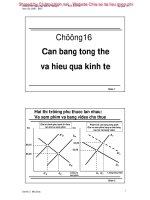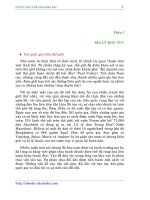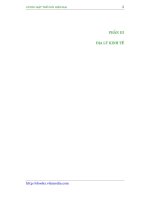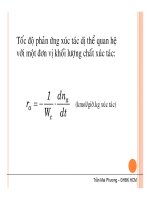- Trang chủ >>
- Y - Dược >>
- Truyền nhiễm
The padamic puzzzle
Bạn đang xem bản rút gọn của tài liệu. Xem và tải ngay bản đầy đủ của tài liệu tại đây (212.43 KB, 9 trang )
An Introduction
Dr. Christopher Zambakari, MBA, M.I.S., LP.D.
ev
The Pandemic Puzzle
iew
ed
THE Z A MBA K A R I A D V I SOR Y | SP E C I A L I SSU E : F A L L 2 0 2 1
LIVING IN A N E R A O F E M E R G I N G PA N D E M I C S
er
r
Founder and CEO, The Zambakari Advisory; assistant editor, Bulletin of the Sudan Studies
Association; Hartley B. and Ruth B. Barker Endowed Rotary Peace Fellow
In December 2019 and January 2020, the severe acute respiratory syndrome
coronavirus 2 (SARS-CoV-2)1 — Covid-19 — took the world by storm. The virus
shutdown major cities around the world, depressed the global economy, caused
pe
substantial excess mortality, and plunged national economies into deep recessions,
pushed millions into unemployment and took the lives of more than four million
people as of July 23, 20212. In the United States alone, life expectancy dropped to
its lowest age since World War II as a result of the lives lost to the deadly disease.
ot
Covid-19 has violently disrupted lives and livelihoods, leaving some countries
and communities without access to appropriate medical care and the emergency
vaccines that have been introduced. Again, in the U.S. alone, the cost of the
tn
pandemic is now forecasted to be as high as $16 trillion by the 4th quarter of 20213.
The pandemic has highlighted several realities worldwide and once more evidenced
the critical importance of prevention and preparation. In many places around
rin
the globe, prevention was abandoned or neglected, despite warnings of possible
future pandemics. Instead of prioritizing preventive measures and preparedness,
According to Glaunsinger, et. al. (2020) “The SARS-CoV-2 genome is a strand of RNA that is about 29,900 bases
ep
1
long – near the limit for RNA viruses. Influenza has about 13,500 bases, and the rhinoviruses that cause common
colds have about 8,000.”
2
“Covid-19 Dashboard.” Johns Hopkins Coronavirus Resource Center. 23 July 2021. www.jhu.edu. Web. coronavi-
Pr
rus.jhu.edu/map.html.
3
“Covid Was Just One – There Could Be 850,000 Other Animal Viruses in the Zoonotic Pipeline.” Phys.org. 30 Oct.
2020. www.phys.org. Web. phys.org/news/2020-10-covid-onethere-animal-viruses-zoonotic.html.
THE PANDEMIC PUZZLE
8
This preprint research paper has not been peer reviewed. Electronic copy available at: />
iew
ed
THE Z A MBA K A R I A D V I SOR Y | SP E C I A L I SSU E : F A L L 2 0 2 1
LIVING IN A N E R A O F E M E R G I N G PA N D E M I C S
governments focused on responding to detection, containment and hope for rapid
development of vaccines and medicines.4
What should we be preparing for or trying to prevent from occurring? In one report,
scientists warned that an “estimated 1.7 million currently undiscovered viruses
are thought to exist in mammal and avian hosts. Of these, 540,000-850,000 could
infect humans.”5
ev
In another realm in the battle against Covid-19, we witnessed “tension between
maintaining social freedoms and engaging in efforts of collective defense against
the virus,” which led to the political appropriation of healthcare policy (mask
wearing practices and social distancing requirements that varied depending
er
r
on political persuasions, as well as debates between liberal and conservative
governments about the efficacy of getting the vaccine, once it was available). Not
lost in the wake of such debate was a resurgence of nationalism in many parts of
the world as the world wrestled to develop and launch measures to slow down the
pe
spread of the virus. 6
The Western world, it appears, is beginning to return to its old life rhythms, comanaging the spread of the virus and possessing ample amounts of the vaccine
to support those who choose to vaccinate. The U.S., for instance, is seeing a return
ot
to the workplace, greater social interactions and an economy that is trending
upward. The successful development of an effective vaccine has brought a sense
tn
of relief to other parts of the world as well.
rin
This “emergence” stands in sharp contrast to what is being experienced in the
4
Woolaston, Katie, and Judith Lorraine Fisher. “UN Report Says up to 850,000 Animal Viruses Could Be Caught by
Humans, Unless We Protect Nature.” The Conversation. 24 June 2021. www.theconversation.com. Web. theconversation.com/un-report-says-up-to-850-000-animal-viruses-could-be-caught-by-humans-unless-we-protect-nature-148911.
“‘Escaping the Era of Pandemics’: IPBES Workshop on Biodiversity and Pandemics.” Bonn, Germany: Intergov-
ep
5
ernmental Science-Policy Platform on Biodiversity and Ecosystem Services (IPBES). 2020. www.ipbes.net. Web.
/>
Pr
6
Disparte, Dante. “Preparing for the next pandemic: Early lessons from Covid-19.” Brookings Institution. 16
Feb. 2021. www.brookings.edu. Web. />
THE PANDEMIC PUZZLE
9
This preprint research paper has not been peer reviewed. Electronic copy available at: />
iew
ed
THE Z A MBA K A R I A D V I SOR Y | SP E C I A L I SSU E : F A L L 2 0 2 1
LIVING IN A N E R A O F E M E R G I N G PA N D E M I C S
non-Western, less-developed, less-affluent world. While many countries in Africa
weren’t as heavily impacted during the first and second waves of the disease
spread, the surge in the new Delta coronavirus in Africa is a reminder that we are
not out of the woods yet; the new variant has already increased case and death
counts where access to vaccines is limited or non-existent7. The Delta variant has
now been confirmed in 22 African countries and “has been found to spread 225
percent faster than the original virus.”8,9 Africa is the least-vaccinated region in
ev
the world, with only around one per cent of the population fully vaccinated.10 Not
surprisingly, this second-largest and second-most populated continent has seen
a rapid surge in the spread of the Delta variant of the virus — “There has been a
tripling in the number of Covid cases and 30,000 fatalities on the continent since
er
r
the end of April when the Delta variant emerged in Uganda.”11
Scientists are warning that we are living in an era of emerging pandemics. That
means “future pandemics will emerge more often, spread more rapidly, do more
damage to the world economy and kill more people.”12 Unless we learn the right
pe
lessons and translate these lessons into concrete policies to prepare for future
pandemics, the problem will only grow in scale and severity because we are more
7
ot
interconnected than at any other time in history.
“Devastating Human Toll as the Delta Covid Variant Takes Hold in Africa.” Africa Center for Strategic Studies. 9
July 2021. www.africacenter.org. Web. />
Doucleff, Michaeleen. “The Delta Variant Isn’t Just Hyper-Contagious. It Also Grows More Rapidly Inside You.”
tn
8
NPR. 8 2021. www.npr.com. Web. />9
Li, Yan, et al. “Viral Infection and Transmission in a Large Well-Traced Outbreak Caused by the Delta SARSCoV-2 Variant.” Virological. 7 July 2021. www.virological.org. Web. />
rin
transmission-in-a-large-well-traced-outbreak-caused-by-the-delta-sars-cov-2-variant/724.
10
Kelly-Linden, Jordan. “World Faces ‘Catastrophic Moral Failure’ in Race to Vaccinate against Covid, WHO
Warns.” The Telegraph. 18 Jan. 2021. www.telegraph.co.uk. Web. />“Devastating Human Toll as the Delta Covid Variant Takes Hold in Africa.” Africa Center for Strategic Studies.
ep
11
July 12, 2021. www.africacenter.org. Web. />
12
“Escaping the Era of Pandemics’: Ipbes Workshop on Biodiversity and Pandemics,” (Bonn, Germany: Intergov-
Pr
ernmental Science-Policy Platform on Biodiversity and Ecosystem Services (IPBES). Accessible from https://
ipbes.net/sites/default/files/2020-12/IPBES%20Workshop%20on%20Biodiversity%20and%20Pandemics%20
Report_0.pdf, 2020).
THE PANDEMIC PUZZLE
10
This preprint research paper has not been peer reviewed. Electronic copy available at: />
countries around the world, a virus outbreak
in Wuhan, China, can travel to New York,
London, Buenos Aires or Pretoria in a
matter of just hours. Covid-19 has driven
home the importance and the need for
scientists, medical experts and healthcare
professionals to transform approaches
to disease mitigation. We must radically
change our global approach to dealing
with infectious diseases; if not, we have
er
r
done nothing to circumvent the possibility
We must radically change our
global approach to dealing
with infectious diseases; if
not, we have done nothing
to circumvent the possibility
of a return of the current
pandemic or the introduction
of something newer and
even more deadly.
ev
With near-supersonic air travel between
iew
ed
THE Z A MBA K A R I A D V I SOR Y | SP E C I A L I SSU E : F A L L 2 0 2 1
LIVING IN A N E R A O F E M E R G I N G PA N D E M I C S
of a return of the current pandemic or the
introduction of something newer and even
more deadly.
pe
Covid-19 also exposed the glaring gaps in pandemic prevention, preparedness and
response around the world. A recent report calls for world leaders to:
tn
ot
“…invest in globally networked surveillance and research that can help
to prevent and detect emerging infectious diseases early, strengthen
national systems in order to strengthen a critical foundation for global
pandemic preparedness and response, make improvement in the global
supply chain for medical supplies to radically shorten the response time
to a pandemic and deliver equitable global access.”13
Above all, the report calls on world leaders to ensure the system is tightly
rin
coordinated, properly funded and with clear accountability for outcomes.
The horrible onslaught of Covid-19 has further exposed the gap between countries
ep
separated by socio-economic and political characteristics. One example is noted
13
A G20 High Level Independent Panel (HLIP) on Financing the Global Commons for Pandemic Preparedness and Response, “A Global Deal for Our Pandemic Age,” (A G20 High Level Independent Panel (HLIP)
on Financing the Global Commons for Pandemic Preparedness and Response. Accessible from https://
Pr
pandemic-financing.org/report/foreword/?utm_source=NASEM+News+and+Publications&utm_campaign=c4029fbe0b-NAP_mail_new_2021_07_12&utm_medium=email&utm_term=0_96101de015-c4029fbe0b-102439521&goal=0_96101de015-c4029fbe0b-102439521&mc_cid=c4029fbe0b&mc_eid=0b96f12522,
2021).
THE PANDEMIC PUZZLE
11
This preprint research paper has not been peer reviewed. Electronic copy available at: />
iew
ed
THE Z A MBA K A R I A D V I SOR Y | SP E C I A L I SSU E : F A L L 2 0 2 1
LIVING IN A N E R A O F E M E R G I N G PA N D E M I C S
among our entries in this Fall 2021 Special Issue: By late March 2021, 86 percent14
of all vaccinations had been administered in Global North countries, a shameful
0.1 percent in the Global South. Western countries are home to the primary vaccine
manufacturers, and as such may experience a greater level of safety and security
in their ready access to protective jabs. But, with a new mutation underway and
able to spread at mach speed, the security and safety of the West depends to a
large extend on the ability of non-Western countries to share in such access to
ev
treatments. Without such access, the new mutation could pose a greater threat in
the future, as previously vaccinated people become susceptible to contracting new
variants and fast-mutating strands.
er
r
What 2019 and 2020 have taught us is that no one is safe unless all are safe; the
security of the West depends on ensuring equal access to the vaccine for those
who are currently unable to secure such attention and care.
In our Fall 2021 Special Issue, we aim to bring together advances in the tools
pe
researchers are developing to combat
this pandemic — from epidemiological
research to social, political and economic
instruments deployed around the world to
tackle the pandemic. In this Special Issue,
ot
we seek to take stock of the consequences
of and the lessons learned from the
known
tn
pandemic, and to explore what is currently
about
the
novel
coronavirus.
This deadly and widespread virus poses
known and unknown dangers to the world
the
rin
community;
ramifications
extend
What 2019 and 2020 have
taught us is that no one is
safe unless all are safe; the
security of the West depends
on ensuring equal access to
the vaccine for those who are
currently unable to secure
such attention and care.
beyond public health.
ep
While 2020 was a challenging year, 2021 is set to be equally challenging with the
emergence of multiple variants of severe acute respiratory syndrome coronavirus
Pr
14
Collins, Keith, and Josh Holder. “See How Rich Countries Got to the Front of the Vaccine Line.” The New York
Times. 31 Mar. 2021. www.nytimes.com. Web. />
THE PANDEMIC PUZZLE
12
This preprint research paper has not been peer reviewed. Electronic copy available at: />
iew
ed
THE Z A MBA K A R I A D V I SOR Y | SP E C I A L I SSU E : F A L L 2 0 2 1
LIVING IN A N E R A O F E M E R G I N G PA N D E M I C S
2 (SARS-CoV-2), new SARS-CoV-2 variants 501Y.V1 (B.1.1.7) in the UK and 501Y.
V2 (B.1.351) in South Africa15. The arrival of vaccines and the advancements in
therapeutic remedies have sparked a flickering light at the end of a dark tunnel.16
But the fact that the rapidly mutating variants evade immunity poses new threats
that the world must confront. What are the different paths to end this pandemic?
In our Fall 2021 Special Issue, we asked scholars, researchers, policymakers,
advocates and business leaders to think about the relationship between public
ev
health and politics, public health and economics, and public health and society
in light of the novel coronavirus. What are the economic implications of the
coronavirus epidemic? What are the impacts and implications of the coronavirus
er
r
on systems of governance, economies and society? What have we learned from
the emergence of the novel coronavirus, the various interventions, and what
are the different ways forward? What are the impacts of coronavirus on specific
cities and neighborhoods? What are the impacts of “social distancing” and other
interventions adopted to contain the transmission of the virus? How have different
pe
regions, countries and the international community responded to the coronavirus
pandemic, and what lessons are we able to apply successfully to slow down and
even end this stifling worldwide pandemic?17
In his contribution, Dr. Rajan Menon, a widely published research expert in the
ot
areas of international relations of Asia and Russia, humanitarian intervention
issues and global ethics, presents readers with a crippling consequence of the
tn
Covid-19: “The concentration of wealth and power globally has enabled rich
countries to all but monopolize available vaccine doses. For the citizens of lowincome and poor countries to have long-term pandemic security, this inequity
rin
must end, rapidly.”
In “Going to Work with Covid,” Dr. Robert Sanders, a retired U.S. Navy JAG Corps
Erik Volz, et al. “Transmission of Sars-Cov-2 Lineage B.1.1.7 in England: Insights from Linking Epidemiological
ep
15
and Genetic Data,” medRxiv (2021); Houriiyah Tegally et al., “Emergence and Rapid Spread of a New Severe Acute
Respiratory Syndrome-Related Coronavirus 2 (Sars-Cov-2) Lineage with Multiple Spike Mutations in South
Africa,” ibid. 2020.
Pr
16
17
L. R. Baden, et al. “Efficacy and Safety of the Mrna-1273 Sars-Cov-2 Vaccine,” N Engl J Med 384, no. 5 (2021); F. P.
Polack, et al. “Safety and Efficacy of the Bnt162b2 Mrna Covid-19 Vaccine,” ibid.383, no. 27 (2020).
Arnaud Fontanet, et al. “Sars-Cov-2 Variants and Ending the Covid-19 Pandemic,” The Lancet. 2021.
THE PANDEMIC PUZZLE
13
This preprint research paper has not been peer reviewed. Electronic copy available at: />
iew
ed
THE Z A MBA K A R I A D V I SOR Y | SP E C I A L I SSU E : F A L L 2 0 2 1
LIVING IN A N E R A O F E M E R G I N G PA N D E M I C S
Captain, posits: “The terrible irony of 2020 and 2021 is that what Usama Bin Laden
hoped to achieve from the September 11, 2001, attacks is exactly what Covid-19
accomplished through its viral scourge, a shutdown of the American economic
engine, and an accumulation of over 600,000 casualties.” Sanders makes the
case that economic security is national security and argues that Covid-19 is
simultaneously a national security problem and a public health concern that has
impacted the American and global economies.
ev
In his contribution, author Dr. Ian Scoones, an agricultural ecologist and a
Professorial Fellow at the Institute of Development Studies at the University of
Sussex in England, asks “Can we learn about how to address uncertainties within
er
r
wider society — including around disease pandemics — from pastoralists who live
with and from uncertainty?” His answer: Yes, we can learn from others, including
pastoralists, who have long embraced uncertainty as part of life.
In “Science Doesn’t Work that Way” contributor Dr. Gregory E. Kaebnick, director
pe
of the editorial department and the editor of the Hastings Center Report, explores
questions about the values at stake in developing and using biotechnologies and,
particularly, in questions about the value given to nature and human nature. He
writes, “What objectivity science is able to deliver derives not from individual
ot
scientists but from the social institutions and practices that structure their work.”
Best-selling New York Times author and well-known investigative journalist Nina
Burleigh tackles the pitfalls of our ability to forget the horrors of a pandemic, and
tn
the consequences. She writes we best not forget hard lessons learned, quoting a
UN report: “Future pandemics will emerge more often, spread more rapidly, do
more damage to the world economy, and kill more people than Covid-19, unless
rin
there is a transformative change in the global approach to dealing with infectious
diseases.” In Part 2 of “The Great Forgetting,” the veteran reporter and author
documents a sampling of behind-the-scenes “political scheming and chaos”
ep
of profit-motivated U.S. government mismanagement and irresponsibility
that impacted the country’s ability to more effectively battle the spread of the
coronavirus disease.
Pr
Kutumbakam is the age-old Indian concept of the world as one family. In “HealthWar Politics,” African Studies Professor Suresh Kumar explores “the status of
THE PANDEMIC PUZZLE
14
This preprint research paper has not been peer reviewed. Electronic copy available at: />
iew
ed
THE Z A MBA K A R I A D V I SOR Y | SP E C I A L I SSU E : F A L L 2 0 2 1
LIVING IN A N E R A O F E M E R G I N G PA N D E M I C S
India’s — and, consequently, the world’s — biological health war, the crippling
propaganda of opposition parties and the affirmative role of the government
in overcoming the health economy for the betterment of the society and the
general economy in the South Asian country.” In other words, living Vasudhaiva
Kutumbakam.
Dr. Rose Jaji is a senior lecturer in the Department of Sociology at the University
of Zimbabwe, conducting research in the areas of migration/refugees and conflict
ev
and peacebuilding. Jaji argues that any gains in mobility realized by low-income
migrant Zimbabwean women have been retarded by the impacts of Covid-19, which
has “eroded and even reversed the gains of migration among low-income migrant
er
r
women in terms of capacity to meet basic needs and socioeconomic status.”
Contributor Richard Atimniraye Nyelade explores the discriminatory aspects
of Covid-19 in his look at the Sino-African paradoxes of the pandemic. In “From
China Virus to Africa Virus,” the author writes that the disease “has led to an
pe
increase in acts of Sinophobia as well as prejudice, xenophobia, discrimination,
violence, and racism against people of East Asian, North Asian, and South Asian
descent and appearance around the world.”
“South Africa’s Response to Covid-19” looks at the “multi-modal approaches
ot
adopted in enhancing economic recovery by the South African government in
responding to the outbreak of the Covid-19 pandemic,” writes contributor Dr.
Andrew Enaifoghe. With a doctorate in public administration from the University
tn
of Zuzuland, Enaifoghe claims a reconceptualization of responsibilities and
relationships is necessary to build a future, post-Covid.
A review by Sudd Institute (Juba, South Sudan) co-founder and scholar Dr. James
rin
Alic Garang contributes to the debate on how Covid-19-induced hysteresis effects
could impact growth in South Sudan. It addresses two related questions: What
channels would transmit the scarring effects of Covid-19 to the national economic
ep
output? And, what can public policy do to support recovery?
Dr. Beth Raps takes a problem-solving, heuristic approach to “help policymakers,
communicators and human beings seeking to understand each other across
Pr
ideological differences explore how each of us may be making decisions about
Covid.” In her contribution, she admits the effort is hard-won, but that “informed
THE PANDEMIC PUZZLE
15
This preprint research paper has not been peer reviewed. Electronic copy available at: />
iew
ed
THE Z A MBA K A R I A D V I SOR Y | SP E C I A L I SSU E : F A L L 2 0 2 1
LIVING IN A N E R A O F E M E R G I N G PA N D E M I C S
compassion can help spare lives, relationships, resources and the possibilities for
pluralistic participatory democracy.”
As each of the contributors would agree, there is so much more work to be done
to address and manage the Covid-19 challenge. Because it kills without prejudice,
perhaps we can learn how to approach, treat and defeat this disease without
prejudice of our own. Perhaps we can find a way — we must find a way — to provide
equal levels of support to all our brothers and sisters around the world. Maybe we
ev
can learn that it is best when we share our research, share our discoveries and
share the results; imagine working together as one for the betterment of all. What
if Covid could bring us together to act responsibly and unselfishly?
er
r
It is our hope that this special issue and the work done by our valued experts will
provide you with a better understanding
— as seen through the thoughts and
perspectives of others — of the evolving
pe
health crisis, its economic impact and ways
we can design an effective intervention
to halt the spread of the virus while also
ot
working on an effective vaccine.
tn
Abut the author
Maybe we can learn that
it is best when we share
our research, share our
discoveries and share
the results; imagine
working together as one
for the betterment of all.
Christopher Zambakari is a Doctor of
Law and Policy; chief executive officer of
The Zambakari Advisory; Hartley B. and Ruth B. Barker Endowed Rotary Peace
rin
Fellow; professor, College of Global Studies at Cambridge Graduate University
International; and assistant editor, The Bulletin of The Sudan Studies Association.
His areas of research and expertise are international law and security, political
ep
reform and economic development, governance and democracy, conflict
management and prevention, and nation- and state-building processes in Africa
and in the Middle East. His work has been published in law, economic and public
Pr
policy journals.
THE PANDEMIC PUZZLE
16
This preprint research paper has not been peer reviewed. Electronic copy available at: />





